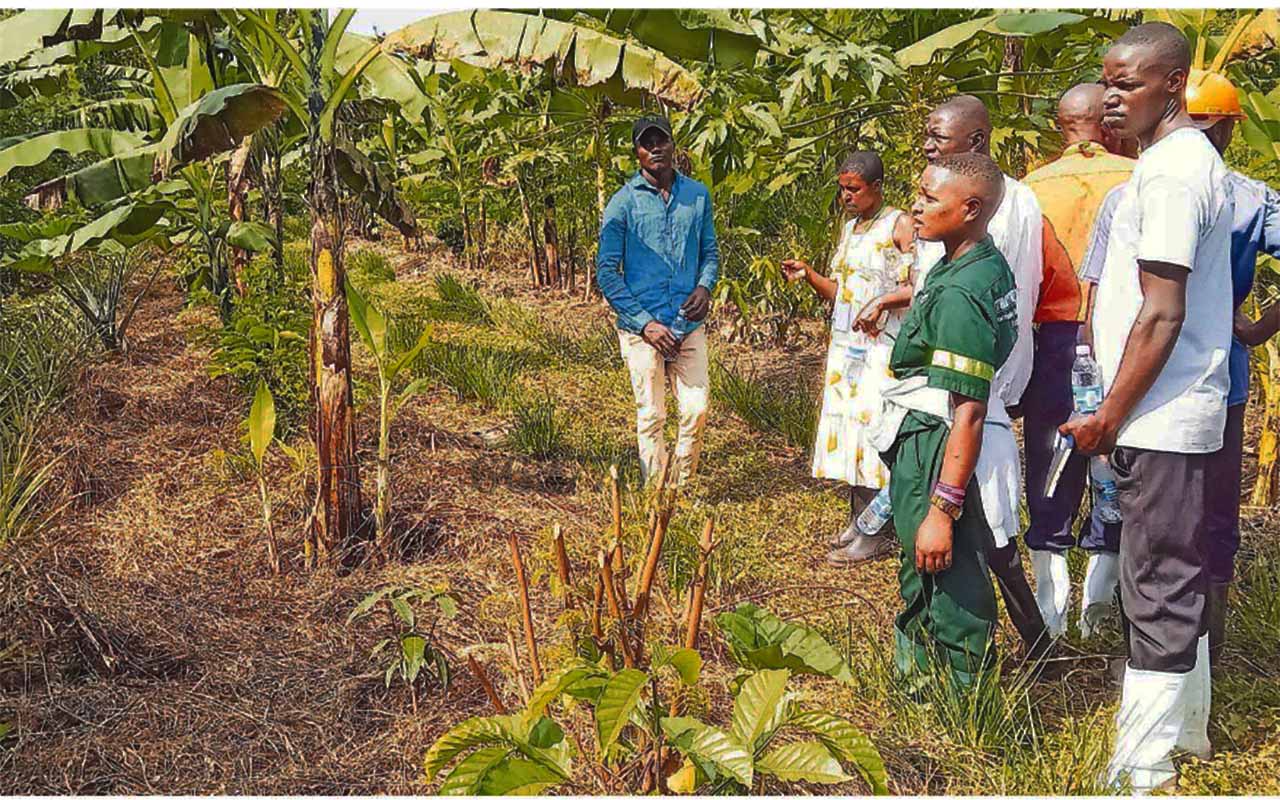
Some Ugandans wait to be cleared at Entebbe International Airport before they take a flight to the United Arab Emirates (UAE) for work in 2021. PHOTO/FILE
Earlier this month www.visualcapitalist.com published a list of 55 countries that were losing huge chunks of their populations to emigration.
Among the top 20 were five African countries namely Mali, Nigeria, Zimbabwe, Sudan and Uganda.
The figures showed that significant chunks of their populations were leaving, but the same countries were not attracting much in terms of people migrating there. The difference between those going out and those coming in is what was referred to as a negative migration.
Sudan came second in the world and first in Africa with a negative migration of 1.35 million followed by Uganda, which was number 12 in the world and number two in Africa with a negative migration of 136,000 in 2023. That rose from negative 118,846 registered in 2022.
Uganda’s numbers were much higher than the negative 97,000 of Zimbabwe and the negative 58,000 of Nigeria.
Uganda fares so badly compared to neighbours Tanzania which has a negative migration of 39,000; the Democratic Republic of Congo which has a negative migration of 15,000; Kenya which has a negative migration of 10,000.
This might not give you the right picture in terms of numbers. It should, however, be noted that the country profile published by the International Organisation for Migration (IOM) shows that the number of emigrants increased by 153 percent between 1990 and 2013.
The profile indicates that there were 731,800 Ugandan emigrants in 2010. The number had increased to 786,200 by 2015. It might have hit the one million mark by the end of 2023.
Sudan’s case
The case of Sudan is understandable. The country has been torn apart during a 16-month-old civil war that has pitted the Rapid Support Forces (RSF), a paramilitary force formerly operated by the government, against the Sudan army.
The Global Conflict Tracker reported on July 24 that 15,000 people have been killed and about 8.2 million have been displaced since April 15, 2023, when the conflict began.
With peace talks that commenced in Switzerland on August 14 this year looking unlikely to bear fruit on account of the army’s decision not to take part, the United Nations has warned that the country is at “breaking point”.
Quoting UN officials, Reuters News Agency reported that “there will be tens of thousands of preventable deaths from hunger, disease, floods, and violence in the coming months”. It would in the circumstances be understandable that huge sections of the population have fled the country.
Uganda’s case
Unlike Sudan, Uganda has been generally peaceful since February 2008 when the Lord’s Resistance Army (LRA) rebels and the government signed a ceasefire agreement which was followed by the Juba peace agreement in September of the same year.
There have also been very little in terms of natural disasters such as earthquakes, landslides, floods or famines to warrant displacement or forced emigration in such numbers.
MUST READ: Why the Middle East is a rose with thorns
What then is fuelling the negative migration? Is it the economics? Or is it the politics? Or both?
The politics
Dr Chris Baryomunsi, the minister of Information and Communications Technology and National Guidance, does not think that huge sections of our population have been forced to flee because of politics.
“Uganda is very peaceful, and the government has established a democratic environment where people are free and are participating in the development of their country. Nobody can claim to be leaving the country because of political persecution,” Dr Baryomunsi says.

Minister of Labour Betty Amongi (2nd R) in Qatar in May 2024. PHOTO/COURTESY
Mr Livingstone Ssewanyana, the executive director of the Foundation for Human Rights Initiative (FHRI) who has previously worked for the United Nations Human Rights Council as an independent expert on the promotion of a democratic and equitable international order, a role which entailed examining states on their democratic development practices, does not agree with Dr Baryomunsi.
The country, he told Monitor in a previous interview, has been retrogressing over the year.
“One would agree with me that there has been a steady democratic drawback in terms of freedoms, in terms of accountability, in terms of functioning of the government, in terms of civic participation,” Mr Ssewanyana said.
The democratic space, he argued, has been shrinking by the day.
“In terms of freedom of expression, association and assembly, if you go by the 1990s you will agree with me that there is hardly any space available for free expression other than those controlled talk shows on radios and televisions, but even when you go to a television station or radio, those who accept to appear actually practice self-censorship. Even when you look at the media whether print or electronic, generally speaking it is not doing well,” Mr Ssewanyana says.
Mr Emmanuel Dombo, the director for communication at the NRM Secretariat, sees things a bit differently.
“Uganda hardly has any political emigrants because every time my brother Hon (Robert) Kyagulanyi (president of the Opposition National Unity Platform) flies out of the country, he does so with a return air ticket to come back and partake of the peace at home. All the other leaders of the other political party do the same. They actually even receive money from the Government of Uganda, and no one can choose exile when their survival is guaranteed at home,” Mr Dombo argues.
There are, however, sections of people who argue that it is only those in Cabinet and the NRM who think that the country is secure.
Others on the other side of the political divide argue that people are being forced to flee because of increasing repression and fears for their personal lives. Testimony to that are the number of young people who have in recent times fled to mostly Canada.
Mr Ssewanyana captures those sentiments.
“There have been also challenges with security because we have seen people losing their lives and they are not explained. So I think overall, depending on the indicators, there is a general decline in terms of democratic development in the country and future to many is very uncertain,” he says.
Economics?
It would, however, look like many people are being forced to flee for economic reasons even when Mr Museveni and other leaders of the NRM have been chest-thumping about having resuscitated the economy and jump-started into growth.
MUST READ: Who is benefiting from maids export?
On July 20 while addressing the nation on the environment, wealth creation, jobs, and regional integration, Museveni boasted that the economy has grown since the NRM shot its way to power.
“…You now hear that our economy has expanded from $1.5 billion in 1986 to now $55b, albeit still being a raw materials producing economy. This is why you hear me insisting that this economy will jump to $500 billion by simply adding value to most of our raw materials – agricultural, minerals, forest products, our freshwater products, etc,” Mr Museveni said.
The problem, Mr Patrick Wakida, the head of the social research firm, Research World International, says is that the growth that NRM has been boasting about has come with very little in terms of employment and business opportunities.
“There is growth, no doubt about that, but unemployment runs faster than growth. We need industrialisation to create more jobs. We need more private sector-led growth,” Mr Wakida says.
IOM publication that we referred to earlier reaffirms this argument.
“The most important factor causing Ugandans to migrate within and outside their country is employment, as economic opportunities in Uganda are limited,” it says.
The paper, ‘Youth Unemployment and Job Creation in Uganda’ which was authored by Mr Peter Magelah and Ms Barbara Ntambirweki Karugonjo and published by the Advocates Coalition for Development and Environment (ACODE), put youth unemployment in Uganda at between 64 and 70 percent.
The problem, the authors say, is that 310,000 people are annually added to the number of unemployed.
“About 400,000 youths are released annually into the job market to compete for approximately 9,000 available jobs. About 30 percent of the youth who are institutionally qualified in Uganda are unable to find jobs, and the situation is even worse for semiskilled and unskilled youth,” the paper says.
This has been partially responsible for the emigration of young people, many of whom leave to find jobs as cleaners, house helps or security guards in mostly the Middle East. According to IOM, by 2017, two percent of migrants leaving Uganda were under the age of 18.

Officials from Middle East recruitment agencies (right) brief Ugandan workers in 2018. PHOTO/FILE
The demand for labourers from Uganda has been growing especially in Asia and the Arab world, but this demand does not have much to do with excellence. It is mostly because they are available to be misused and exploited.
Pay issues
That those who cannot find jobs are paid peanuts compounds the problem.
“Above all, people need (well) paying jobs. Some people leave jobs here because of poor pay or working conditions, while the majority of people going have no skills or qualifications. So they go for casual employment,” Mr Wakida says.
The issues around poor pay in Uganda, ageing populations in countries like Canada, and the demand for health professionals and other expats in science and technology have led to the departure of professionals for paying jobs in those countries.
“The emigration of such professionals is considered one of the reasons for the decline of health care in government facilities in Uganda. Healthcare professionals earn 12 times more in the UK and four times more in Kenya,” the IOM document says.
One of the other factors fuelling the emigration is Uganda’s high population growth. The presence of so many young people in Uganda influences the availability or non-availability of jobs. Lack of access to land, natural resources and working capital exacerbates the problem.
Recurrence
The issue of growth without jobs and opportunities is not new.
In 2020, the World Bank urged authorities in Kampala to ask itself two questions. Why was the country not creating enough jobs? Second, why people’s incomes were either stagnant or diminishing? The same institution raised similar issues earlier this year, but with a tweak – it raised issues about the failure of the economy to produce quality jobs.
If Mr Museveni’s comments on July 20 are anything to go by, it appears that the government has been trying to find answers to the questions that were posed by the World Bank.
“Our strategic goal is to make every adult Ugandan of working age, join one of these sectors (commercial agriculture with ekibalo; manufacturing and artisanship; services (hotels, transport, entertainment, etc.); and ICT either as an owner or as an employee,” Mr Museveni said.

President Museveni (left) arrives for his State-of-the-Nation address in 2023. PHOTO/FILE/DAVID LUBOWA
Will adding that to programmes like the Parish Development Model (PDM), the Emyooga Programmes and others like the Youth Livelihood Development Programme end the flight? That we wait to see.







